What’s the hottest and fastest growing sport in the nation?
It may well be barbecue. There are now more than 500 barbecue cookoffs in the US, including several on TV with a winner’s silk purse of up to $75,000. “The meats have been marinated; the cookers fired and stoked,” barked the teaser, “Watch as the best pit men in the country line up ready to do battle, apron to apron.” Cooking on steel smokers the size of sofas, these are the real iron chefs.
In 2006, Mike Davis of Marietta, OK, and his wife Debbie, a.k.a. Lotta Bull BBQ, set a record for winnings in when they won 11 Grand Championships on the barbecue circuit, including the biggest of them all, the The American Royal Open in Kansas City. Some observers speculate they may have grossed close to $200,000 that year. Even after deducting about $50,000 expenses, that’s more than most restaurant chefs make a year. Heck, that’s more than a lot of restaurant owners make in a year.
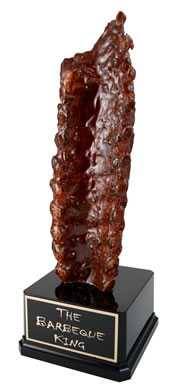
Prize money and trophies like this one from FarOutAwards.com are not the only rewards competitors reap. More than a few have turned their trophies into venture capital and opened restaurants. Scores have used their accolades to win shelf space for their sauces and spice rubs in grocery stores. Many have launched catering services using the elaborate rigs they bought for competition cooking, while others have become so enamored of the gypsy lifestyle that they’ve hit the road selling ribs, rubs, sauces, and marinades at state and county fairs.
Smoke gets in your eyes, and blood
Most say that once you’ve competed, you get addicted. Then you buy a Winnebago and a huge techno-pit on wheels custom made for you by a welder in Texas for only $15,000. You pack your gear Wednesday night (don’t forget the first aid kit and the insect repellent), and at first light Thursday you and your spouse pick up a buddy who will watch the fire on the late shift, and you drive all day.
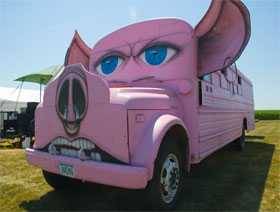
Thursday night you check into the competition site, usually a park or campground, find your berth by the creek, turn on the boom box, crack open a few bottles, and stay up all night laughing and swapping lies and recipes with your chums from across the nation. Everyone has a colorful sobriquet. There’s Jellybean, Millhopper, Crutch, and of course, Belly. Sometimes the hosts have a party for the teams, like the one that the folks at Jack Daniel’s World Championship Invitational Barbecue (“The Jack”) cook up on a mountaintop overlooking Lynchburg, TN, complete with bluegrass bands and unlimited Tennessee sippin’ whiskey, most of which is not sipped. Some sauced cooks crash in their campers, others on cots, and a few treat themselves to a local hotel.

Friday you sleep in, and when your crew is de-slimed, you fry up some bacon and eggs, brew lots of strong coffee, set up your tent and prep tables, fire up the pits, and begin the rubbing, marinating, injecting, and test cooking. The air is filled with the sweet perfume of hardwood smoke, roasting meat, and burning sugar as teams prepare food for themselves and friends. Music thumps from every tent, dogs yip at passersby, kids play tag among the campers, reporters from local TV stations do their stand-ups in front of your tent, your assistant cuts himself with a chef’s knife, and you can’t remember where you packed the first aid kit. The scene is a riot of color with pig-shaped pink school buses, whirlygigs, flags, brightly colored tents, Hawaiian shirts, and every kind of cartoon pig and cow mascot imaginable. Around sunset there is usually a meeting for all cooks with the organizers, then you put a whole hog on the smoker and start getting ready for another party.
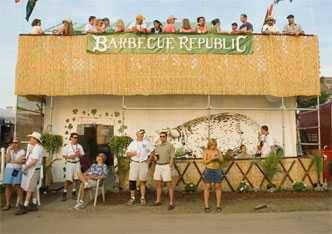
At Memphis in May most booths are decorated in sync with the annual theme, and the teams host a f?te for friends, media, and sponsors. Some booths are marvels of scaffold architecture, with multiple levels, dance floors, and disco lights. Everything imaginable goes on the grill, from venison to cobblers.
In the wee hours, after the party people have staggered off, you slip the pork shoulders and beef briskets under the squeaky steel door of the smoker and try to grab some shuteye.
Saturday morning, everyone is up early for breakfast, and in go the ribs. Things are blurry from the pace and last night’s beverages as turn-in time approaches. The ribs are arranged artfully in the official Styrofoam clamshell for the 1 p.m. presentation to the judges. There is typically a 10 minute window, so you don’t dare be late lest you be disqualified. Then go the other dishes in rapid succession: pulled pork, chicken, brisket, and whatever else the organizers have dared you to cook. Today it’s desserts, and you can’t remember what soft ball temperature is. Whatever.
The judges gather in a big tent where Ardie “Remus Powers” Davis, Ph. B., replete with black bowler, bow tie, wing-collar tuxedo shirt, and starched white apron, orders them to raise their right hands and “solemnly swear to objectively and subjectively evaluate each barbecue meat… so that truth, justice, excellence in barbecue, and the American Way of Life, may be strengthened and preserved forever” (the complete oath is in the sidebar at right). They settle into their folding chairs and begin the dirty job of tasting from the boxes identified only by code numbers. The napkin pile goes down fast. Without conferring among themselves, the scores are turned over to the computer crew. You watch the tent nervously, fantasizing that someone will come rushing out screaming your code number and accolades.
By 6 p.m. you’re in the judges’ tent, hoarse from cheering at the raucous award ceremony. You’ve collected your trophy and check (or more likely, not), and you party all night again. Or maybe you sulk. Sunday morning, you load up your gear, and hit the road. With luck, you crawl into your own bed at home in the wee hours of Monday morning.
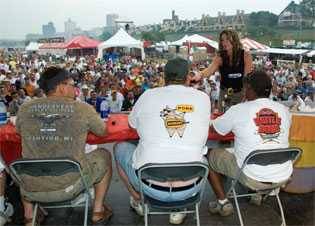
Some teams, like Lotta Bull, will repeat this ritual 40 times a year. You’ve gotta have an understanding boss. By the time “The Jack” unofficially wraps the season in late October in Lynchburg, you’ve covered thousands of miles and spent tens of thousands of dollars. As gas prices climb your enthusiasm for next season is challenged. Alas, only a few teams offset their costs with prize money.
So what attracts them? The majority of the team leaders are white male ex-jocks whose competitive flame continues to burn, even though they can’t see their belts. Then there are the lures of fire, the big metal toys, great meat, the seductive scent of hardwood smoke, fellowship, and dreams of fame and fortune.
Mike Davis does it “for the thrill of it.” He says, “I thrive on this stuff. It’s in my blood. My wife and I can do it together. We never get tired of it. The people we meet are just fantastic. Even when you don’t win, you can be happy for your buddies. Of course I’m happier when we win.”
According to “Rockin’ Ronnie” Shewchuk, author of the book Barbecue Secrets, “Barbecue at its best is a spiritual experience, and I like to think of what I do as high ceremonial cooking. You’re not really serious about barbecue until you’ve slept next to your smoker and used a bag of charcoal as a pillow.”
Before you go to watch
If you are fascinated by the barbecue cookoffs on the TV, you need to know this before you load up the gang and head out on an empty stomach.
At most competitions, the cooks haven’t got the capacity to feed the public. Their cookers are relatively small, and they are focused on their competition entries.
On Saturday morning after they submit their entries, they often give away their leftovers for free. But there’s not much, just a taste. To understand what it is like to be a competition cook, go behind the scenes with a real iron chef.
There are a few exceptions. The Nugget Rib Cook-Off in Reno, NV, usually in early September, is a big event with some top cooks. Unlike most competitions, the teams must cook for the public which is asked to vote for their fave.
Some events, usually those called “festivals” arrange to have a few vendors selling barbecue and sides. These are often a select few competitors who have the capacity and staff to compete and vend. Here are a few, according to Carolyn Wells of the Kansas City Barbeque Society (KCBS). They have a massive database of competitions, but there is no info about which have vendors. Keep in mind, that most of these have no more than a handful of vendors so they can attract good cooks by guaranteeing them a profit, and they are making fine food, but it is not made exactly the same way as the meat served to the judges.
Selected competitions
Below are some of the most prestigious competitions. The Kansas City Barbecue Society (KCBS) is the largest sanctioning body and its website lists the rules and judging criteria as well as all the events they sanction.
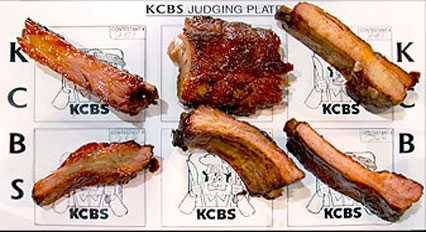
The American Royal Open is the flagship event for the the KCBS on the first weekend of October. There’s music, clowns, and plenty to eat. More than 500 teams made the pilgrimage to this capital of barbecue in 2006, its 27th year. The sprawling event filled almost 17 acres and awarded more than $110,000 in prizes.
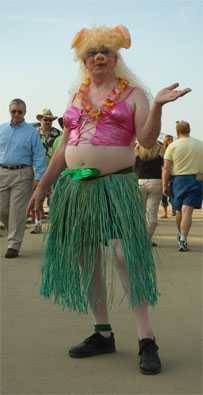
Memphis in May. “The Largest Pork Barbecue Cooking Contest on the Planet” is held on the banks of the Mississippi in the other major capital of barbecue. By invitation only, more than 250 teams compete for some serious cash prizes by cooking only pork. As in all legit competitions, judges taste blind. But at MIM, some judges visit the team sites, inspect the rigs, and taste at elegant tables with uniformed team members waiting on them. As the trained experts gnaw on bones, the team captain regales them with hogwash about how they use a secret recipe given to them by grandpa, and how they stayed up all night massaging the meat before it went on the cooker.
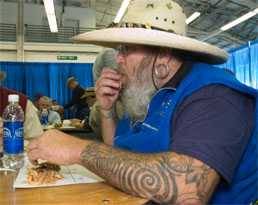
Competitors go all out to create environments with restaurant-like themes that run the gamut from elegant to whimsical and weave elaborate lies for the skeptical tasters. Teams dress silly and act sillier. Located in a park, the 3-day hogfest is visited by more than 90,000 porkaholics. At night the teams invite friends and family and the party goes on until the wee hours. There’s about $65,000 in prize money (plus sponsor bonuses to winners using their products), and the Grand Champion can walk off with a check for more than $20,000.
The Jack Daniel’s World Championship Invitational Barbecue (“The Jack”) is the most prestigious international event. It is KCBS supervised and held in October in Lynchburg, TN at the world-famous Jack Daniel’s distillery. Only teams that have won state or national competitions are invited to compete. Because the field is small, top notch, and the whiskey is smooth, this is the one all the cooks want to get to.

Getting started
There are two or three cookoffs every weekend in the summer. If this kind of sport sounds like something you need to do, there are about two dozen barbecue societies in the nation, and you should join a few. Many hold meetings, demos, and seminars. Some even sponsor and sanction competitions, providing a set of rules, judging procedures, certified judges, publicity, and cumulative point totals towards annual titles. If you’re not ready to go whole hog, many contests have “back porch” divisions for beginners. Small entry fees, small trophies, big fun. Here’s a list of every barbecue association I can find, with some descriptive info on the largest and most important.
Arizona Barbeque. A lively active group whose site has a calendar of activities and a forum.
California BBQ Association. There’s a lively online interactive forum on their website, and unlike many association websites, they actually keep their calendar of events up to date!
Canadian BBQ Society. There is a lively barbecue community in Canada. These folks are fired up and they even compete in winter!
Caribbean BBQ Association. Some experts argue that barbecue originated in the Caribbean, and the spiritual descendants of the inventors live in Haiti, Dominican Republic, Puerto Rico, and the Antilles.
Florida Barbecue Association. They call themselves “crackers” and they are passionate about que. They sanction quite a few events, classes, and judge certification courses around the state. The website even has a guide to BBQ joints in Florida.
Hearth, Patio, & Barbecue Association (HPBA). The trade association for grill manufacturers, distributors, reps, and retailers. The annual conference is a great place to see the new toys coming on the market.
Illinois BBQ Alliance. An active group sponsoring activities mostly in the Chicago area.
International Barbeque Cookers Association. The IBCA sanctions more than 130 competitions in nine states, but most of them are in Texas. One of their largest events, Traders Village in Grand Prairie, TX, attracts more than 100 teams. They judge beef brisket, chicken halves, pork spareribs, and pinto beans.
Iowa Barbeque Society. The largest pork producing state knows barbecue, and participates in numerous contests. Sadly, the website is out of date and offers little.
Kansas City Barbeque Society. The largest and most important barbecue society in the world, KCBS sanctioned 223 competitions in 41 states in 2006, up 28% from 2005. All KCBS-sanctioned competitions have categories for pork shoulder, pork ribs, chicken, and beef brisket, and many feature local specialties or fun “anything but” categories such as fish or desserts. The Kansas City BullSheet, their monthly tabloid newspaper, is filled with news of events past and future, debates on competition rules, reviews or products, cooking tips, recipes, commentary, and useful ads. Their flagship event is the largest barbecue competition in the world, The American Royal Open in Kansas City. Membership is $35 per year and includes a subscription to the BullSheet. If you’re serious about barbecue, get on this bus.
Lone Star Barbecue Society. Brisket is king, but they also judge spareribs and chicken. One event has a goat category, and another judges wild hog!
Memphis Barbecue Association. Their flagship event, Memphis in May, is billed as “World Championship Barbecue Cooking Contest”. Add this to your list of things to see before you die.
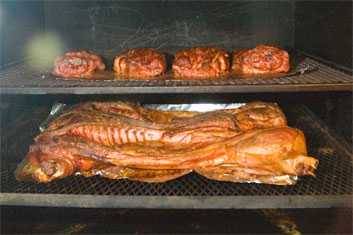
Memphis Barbecue Network. Founded in 2007, this is a group of people who are active in barbecue competitions that were once under the wing of the Memphis Barbecue Association (MBA). But in 2007 MBA decided to focus on Memphis in May, its flagship, and stop sanctioning other events. That left a number of events without an oversight sanctioning body, so they banded together to form MBN. Got it?
Mid Atlantic BBQ Association. Small but growing.
National Barbecue Association. This is a trade association catering to the needs of restaurants and caterers. Their annual convention includes a major sauce competition, a session called “Consulting with the BBQ Masters”, and a bus tour of local barbecue restaurants. Individual memberships are $50 per year, business memberships are $150, and a subscription to the monthly National Barbecue News is included.
New England BBQ Society. They have a lively email list with interesting debate and a recipe exchange.
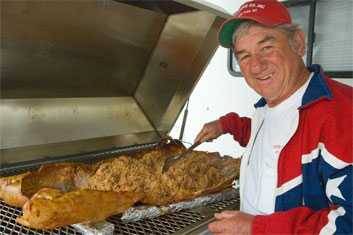
Pacific Northwest BBQ Association. With more than 400 members, they organize events from Whistler, British Columbia in the north, to Oregon in the south, Calgary, Alberta in the east, and of course the Walla Walla, Washington Onion Cookoff in the middle. There are numerous courses for cooks, and naturally there are salmon competitions.
South Carolina Barbeque Association. This fast growing organization sanctioned about 20 competitions, all in the state. Founder, Lake High, is one of the most knowledgeable and colorful characters in the barbecue universe.
Swiss Barbecue Association. The home page promises “Fire, Food and Fun” in English, and the rest is in German. The teams I have met practice what they preach.
World Barbecue Association. The website lists competitions from New Zealand to Moscow-Krasnogorsk!
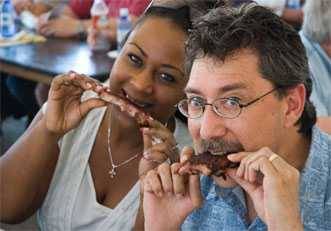
American Chuckwagon Association
There is a whole world out there of folks devoted to re-creating cowboy and chuck wagon cooking. Many have even built replica chuck wagons, or somehow found an original and restored it. Chuck wagons were the original RVs, cooking meals on wheels as they accompanied cattle drives up the Chisholm Trail from Texas to Kansas and on to the slaughterhouses in Chicago. These historians crossed with cooks are experts at campfire cooking and take it to another level with an array of cast iron pans, pots, griddles, and Dutch ovens. They hold at least 50 gatherings, big feeds, and cookoffs every year in many locations in the West. This is a whole culinary style in itself.
Steak Cookoff Association
This relatively new sanctioning body has seen rapid growth with a number of steak competitions across the nation. I have judged at them and they are a blast!
Buy this book
George Hensler is the captain of a barbecue team, and he has written a very helpful short book on what you need to know before entering your first contest.

Hensler’s book, Startin’ the Fire, is informative, friendly, funny, and conversational, with a real homespun feel. There are 29 chapters in the 99 pages with titles such as Team Building, Selecting a Team Name, Transportation, Equipment Selection, Site Safety, Box Building 101, and more.
His blog is equally informative and fun. Here’s one of my favorite entries, called Casual Encounters.
Official KCBS Barbecue Judges’ Oath
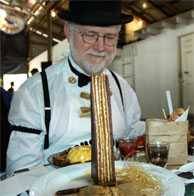
In 1984, Ardie “Remus Powers” Davis, Ph. B. (above), wrote the judges’ oath for the Diddy-Wa-Diddy National Barbecue Sauce Contest. It was adapted later for KCBS contests and is administered to the judges before each contest.
I do solemnly swear
To objectively and subjectively evaluate
Each Barbecue Meat
That is presented
To my eyes,
my nose,
my hands,
and my palate.
I accept my duty
To be a [name of contest] judge,
So that truth,
justice,
excellence in barbecue,
and the American Way of Life,
May be strengthened and preserved forever.
You’re on your oath!

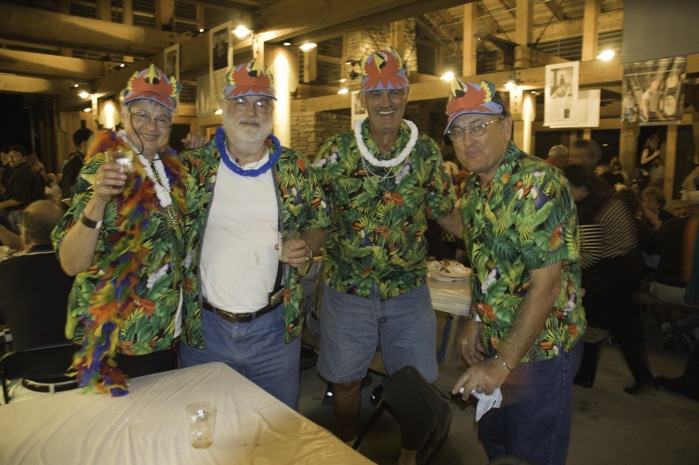

High quality websites are expensive to run. If you help us, we’ll pay you back bigtime with an ad-free experience and a lot of freebies!
Millions come to AmazingRibs.com every month for high quality tested recipes, tips on technique, science, mythbusting, product reviews, and inspiration. But it is expensive to run a website with more than 2,000 pages and we don’t have a big corporate partner to subsidize us.
Our most important source of sustenance is people who join our Pitmaster Club. But please don’t think of it as a donation. Members get MANY great benefits. We block all third-party ads, we give members free ebooks, magazines, interviews, webinars, more recipes, a monthly sweepstakes with prizes worth up to $2,000, discounts on products, and best of all a community of like-minded cooks free of flame wars. Click below to see all the benefits, take a free 30 day trial, and help keep this site alive.
Post comments and questions below
1) Please try the search box at the top of every page before you ask for help.
2) Try to post your question to the appropriate page.
3) Tell us everything we need to know to help such as the type of cooker and thermometer. Dial thermometers are often off by as much as 50°F so if you are not using a good digital thermometer we probably can’t help you with time and temp questions. Please read this article about thermometers.
4) If you are a member of the Pitmaster Club, your comments login is probably different.
5) Posts with links in them may not appear immediately.
Moderators